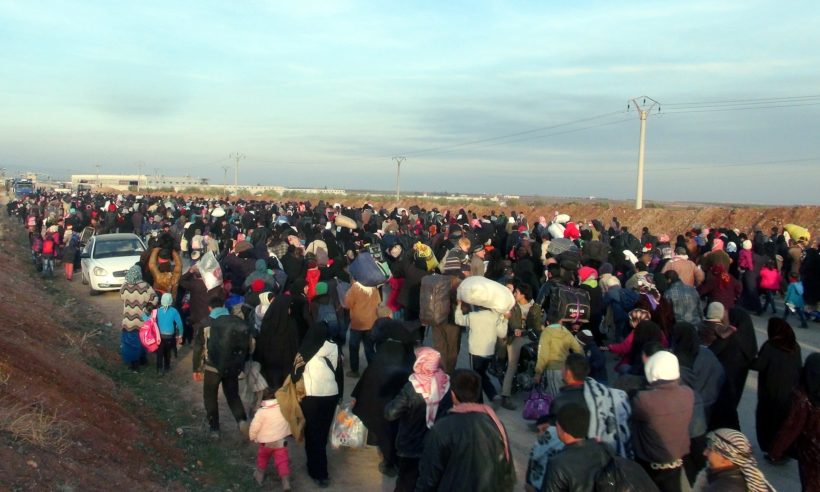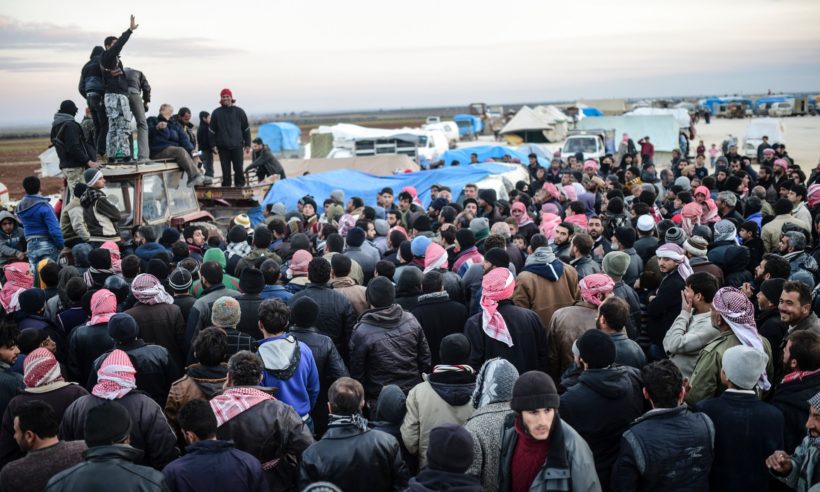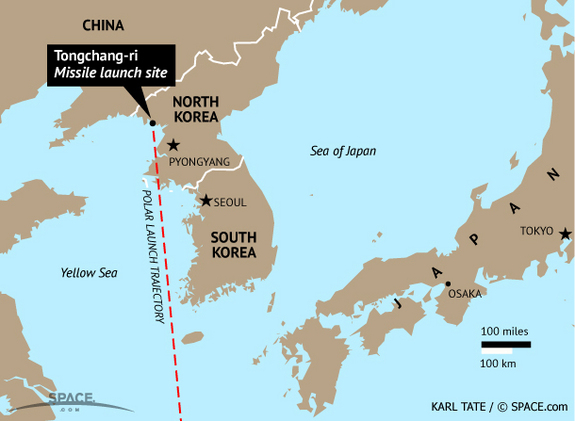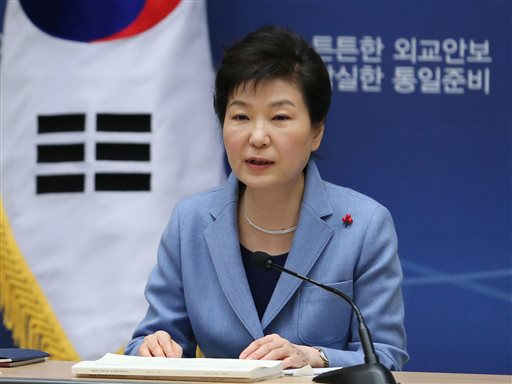News from Nigeria, Turkey and North Korea
Tuesday's World Events — Posted on February 9, 2016
NIGERIA – President says Nigerians’ reputation for crime has made them unwelcome in Britain
Nigeria’s president has warned his fellow citizens to stop trying to make asylum claims in Britain, saying that their reputation for criminality has made it hard for them to be “accepted” abroad.
Muhammadu Buhari, the tough ex-general elected last year, said those who had joined the migrant exodus to Europe were doing so purely for economic reasons rather than because they were in danger.
He added that because of the number of Nigerians imprisoned for law-breaking in Britain and elsewhere, they were also unlikely to get much sympathy.
“Some Nigerians claim that life is too difficult back home, but they have also made it difficult for Europeans and Americans to accept them because of the number of Nigerians in prisons all over the world accused of drug trafficking or human trafficking,” he told The Telegraph.
“I don’t think Nigerians have anybody to blame. They can remain at home, where their services are required to rebuild the country.”
Mr. Buhari’s remarks may upset refugees’ rights groups, who claim that the vast majority of asylum cases lodged by Nigerians are genuine. In recent years, many have said they are fleeing Boko Haram, the Islamist terrorist group that Mr. Buhari’s army is now struggling to stamp out in northern Nigeria.
However, only around one in ten of the 13,000 asylum claims lodged by Nigerians in Britain in the last 15 years have been accepted.
And the claims of persecution appear to cut no ice at all with Mr. Buhari, a headmasterly figure who famously waged a “war on indiscipline” on his fellow Nigerians while serving as the country’s military ruler in the 1980s.

Back then, Nigerians could be whipped if they did not stand in line at bus queues, while lazy civil servants were forced to do frog jumps in the office if they arrived for work late.
While he has not re-introduced such measures as a civilian ruler, he makes it clear that a minority of his countrymen could still do with improving their behavior. “We have an image problem abroad and we are on our way to salvage that,” he said.
Mr. Buhari, 73, made his remarks in a wide-ranging interview during a three-day trip to London, where he was among world leaders attending Thursday’s international conference on the Syrian crisis and the ongoing war on terror.
He won power last year on a pledge to take a firmer line with Boko Haram than his predecessor, Goodluck Jonathan, under whose watch the group kidnapped more than 200 schoolgirls from Chibok in Nigeria’s north east in 2014.
While Boko Haram has lost most of the territory that it controlled until last year, it has continued to mount savage guerrilla attacks, killing 65 people during a raid only last weekend.
There is still no sign of the missing girls either, whose plight attracted worldwide publicity via a celebrity-backed social media campaign.
Despite pressure from Western governments not to make any concessions to Boko Haram, Mr. Buhari said that he was willing to negotiate for the girls’ release if reliable interlocutors could be found. “As long as we can establish the bona fides of the leadership of Boko Haram, we are prepared as a government to discuss with them how to get the girls back,” he said. “But we have not established any evidence of a credible leadership.” …
TURKEY – Up to 75,000 Syrian refugees expected to reach Turkish border
A new flood of Syrian refugees that some predicted could swell to 75,000 rushed to the Turkish border Saturday, fleeing advancing armies loyal to Syrian President Bashar al-Assad and intense Russian airstrikes pounding the city of Aleppo and nearby towns.

Syrians make their way to the Esselame border gate, in the Turkish province of Kilis, as they flee airstrikes in and around Aleppo. (Photo: The Guardian/Anadolu Agency/Getty Images)
Turkish Foreign Minister Mevlut Cavusoglu said his country would continue to keep its borders open to those fleeing the fighting, but there was some question about how open the borders actually were.
“We need to keep this open-door policy for them,” Cavusoglu said after meeting with European Union foreign ministers in Amsterdam. “We have received already more than 5,000 of them. Another 50 to 55,000 of them are on the way and we cannot leave them there.”
Reports from the rainy border Saturday said Turkey was trying to find space in existing refugee camps as Assad’s forces closed in on rebels in Aleppo, Syria’s second-largest city.
But the border crossing at Bab al-Salam — a main crossing point for refugees and humanitarian aid — remained shut Saturday for a second day, The AP reported.

Reports said tensions among the growing numbers of refugees waiting on the border were rising by the day.
On Saturday, groups of young men clashed over access to the small amounts of relief handed out by aid groups. As thousands waited in the rain for their share of scarce tents and food, the atmosphere turned hostile, with outbreaks of arguments and jostling.
More violent protests erupted after rumors spread that the Turkish government was planning to move those waiting away from the border point to a camp near the ISIS front lines, just five miles to the east and still inside Syria.
More than 1,000 people are waiting there – at the villages of Shemarin and Hawar Kilis – hoping to cross illegally under the cover of darkness.
A senior government official, Gov. Suleyman Tapsiz of the border province of Kilis, said Turkey had the ability to care for the Syrians inside Syria for the time being, but had made preparations to allow them in, in the event of an “extraordinary crisis.”

Syrians gather at the Bab al-Salam border gate with Turkey, in Syria, Saturday, Feb. 6, 2016.
Tapsiz said around 35,000 Syrians had reached the border crossing in the space of 48 hours.
“Our doors are not closed, but at the moment there is no need to host such people inside our borders,” he said.
Some 2.5 million refugees from Syria are already in Turkey. More than a million other migrants, largely Syrian, swept into the 28-nation European Union last year.
Some of those who entered Europe are believed linked to ISIS, and may have traveled with the ringleader of the Paris attacks.
Controlling access to Aleppo will prove a powerful bargaining chip for Assad in political negotiations through which the UN hopes to achieve a “road map to peace,” including free and fair elections next year.
Talks in Geneva had barely started when they fell apart Wednesday as regime-backed forces advanced into the northern suburbs. Opposition representatives left in disgust.
NORTH KOREA – North Korea Launches Rocket Seen as Cover for a Missile Test
SEOUL, South Korea – Defying warnings of tougher sanctions from Washington, North Korea launched a rocket on Sunday that Western experts believe is part of a program to develop intercontinental ballistic missile technologies.

In this undated photo, North Korean leader Kim Jong Un directed his top military leaders (who always carry notebooks to make notes of Jong-un’s words of wisdom).
The rocket blasted off from Tongchang-ri, the North’s main satellite launch site near its northwestern border with China, a spokesman for the South Korean Defense Ministry said.

North Korea’s missile launch site is located at Tongchang-ri. (Image: Karl Tate/SPACE.com)
President Park Geun-hye of South Korea called an emergency meeting of top national security advisers on Sunday to address the launch, her office said. South Korea, the United States and Japan also requested an emergency meeting of the United Nations Security Council.
In Washington, Secretary of State John Kerry called the launch a “major provocation, threatening not only the security of the Korean Peninsula, but that of the region and the United States as well.” Susan E. Rice, the national security adviser, said it was “a flagrant violation of multiple United Nations Security Council resolutions.”
[At the emergency meeting Sunday, members of the U.N. Security Council “strongly condemned” the launch and reaffirmed that “a clear threat to international peace and security continues to exist, especially in the context of the nuclear test.”
Security Council members have previously threatened “further significant measures” if there was another North Korean launch and now will “adopt expeditiously a new Security Council resolution with such measures in response to these dangerous and serious violations,” according to a statement read after the meeting.]

South Korea’s President, Park Geun-Hye (above), called the rocket launch early Sunday an “intolerable provocation.” (Photo: Baek Seung-ryul/Yonhap via AP)
The United States and allied nations had condemned North Korea’s plan because they consider its satellite program to be a sort of cover for developing an intercontinental ballistic missile capable of delivering a nuclear bomb. Under a series of Security Council resolutions, North Korea is prohibited from developing nuclear weapons or ballistic-missile technologies.
Sung-Yoon Lee, a professor at the Fletcher School of Law and Diplomacy at Tufts University, said the North Korean leader Kim Jong-un, whose family has ruled the country for seven decades, wanted to show off advances in his missile and nuclear programs just before the Feb. 16 birthday of his father, Kim Jong-il, who died in 2011. Pyongyang has timed some of its earlier nuclear and rocket tests to major national anniversaries.
North Korea insists its space program is peaceful, intended to put scientific satellites into orbit. It has attempted several launches since 1998, finally succeeding in putting a small satellite into space in 2012.
But the United States and its allies consider the program a pretext for developing technologies that can also be used to build an intercontinental ballistic missile. The North’s launch of a three-stage rocket on Sunday, after a similar test in 2012, showed that the country was determined to acquire them despite sanctions imposed by the Security Council.
Hours after the North declared the success of its launch on Sunday, the United States and South Korea jointly announced that they had begun discussing deployment of the American Thaad ballistic missile defense system. China, South Korea’s largest trade partner, has warned it would consider the system’s presence in [South Korea] a threat to [China’s] security.
(The news briefs above are from wire reports and staff reports posted at London’s Daily Telegraph on Feb. 5, NY Post on Feb. 6 and The NY Times on Feb. 6/7.)
Questions
1. For each of the 3 countries, give the following information:
- capital
- location/the countries that share its borders
- the religious breakdown of the population
- the type of government
- the chief of state (and head of government if different) If monarch or dictator, since what date has he/she ruled? – include name of heir apparent for monarch
- the population
Find the answers at the CIA World FactBook website. For each country, answers can be found under the “Geography” “People” and “Government” headings.
Or, go to Wikipedia – search there for “Religion in ___” or “Politics of ____” for the leaders. Or do an internet search for “Population of ___.”
NOTE to students: Before answering the questions below, read the information under “Background.”
2. For NIGERIA:
a) list the who, what, where and when of the news item
b) For what reason did President Buhari say Nigerians are making asylum claims?
c) Why did he say it is unlikely that Nigerians will get any sympathy in their bids for asylum? (What accusations does he make?)
d) What suggestion does President Buhari make for what Nigerians should do?
3. For TURKEY:
a) list the who, what, where and when of the news item
b) What challenges do Syrian refugees face once they are admitted to Turkey?
c) What motive does the Turkish government have for preventing Syrians from crossing through Turkey into Europe?
d) What do you think about the ineptitude of the United Nations, the European Union, the Turkish government… to effectively address this crisis? (Ask a parent also.)
4. For NORTH KOREA:
a) list the who, what, where and when of the news item
b) What is the real concern the U.S., South Korea, the U.N., etc. have about this rocket launch?
Background
NIGERIA - MUHAMMADU BUHARI (from wikipedia):
- Muhammadu Buhari is a retired Nigerian Army major general and was Head of State of Nigeria from December 31, 1983 to August 27, 1985, after taking power in a military coup d’état.
- The term Buharism is ascribed to the Buhari military government.
- He unsuccessfully ran for the office of President in the 2003, 2007 and 2011 general elections.
- In December 2014, he emerged as the presidential candidate of the All Progressives Congress for the March 2015 general elections. Buhari won the election, defeating the incumbent President Goodluck Jonathan.
- This marked the first time in the history of Nigeria that an incumbent president lost to an opposition candidate in a general election.
- Buhari was sworn in on May 29, 2015.
- Buhari has stated that he takes responsibility for anything over which he presided during his military rule, and that he cannot change the past. He has described himself as a “converted democrat.”
- Previously, Buhari gave his support for the total implementation of Sharia (Islamic law) in the country. He was quoted in 2001 as saying “I will continue to show openly and inside me the total commitment to the Sharia movement that is sweeping all over Nigeria”, he then added that; “God willing, we will not stop the agitation for the total implementation of the Sharia in the country.”
- In January 2015, while campaigning for the 2015 general election, Buhari stated that he favoured freedom of religion, that every Nigerian should be free and secure to practice their different religions. Buhari said, “Religion must never be used as an excuse to divide us, oppress others or gain unfair advantage. All my life I have expressed the belief that all Nigerians must worship God according to their wish.”
- Buhari has denied all allegations that he has a radical Islamist agenda. In January 2015, Buhari said “Because they can’t attack our record, they accuse me falsely of ethnic jingoism; they accuse me falsely of religious fundamentalism. Because they cannot attack our record, they accuse us falsely of calling for election violence – when we have only insisted on peace. Even as Head of State, we never imposed Sha’riah.” Time will tell.
TURKEY - from an Oct. 2015 Reuters report on the plight of Syrian refugees currently in Turkey:
- As of October 2015, Syrian refugees were not allowed to work legally in Turkey. Some families said they are forced to make their children work illegally just to scrape by.
- Syrians who do work illegally are paid less or sometimes not at all, and if they complain to the authorities they face fines. Refugees say access to healthcare is patchy, and language difficulties making communication with doctors difficult.
- Turkey’s 26 refugee camps can host 330,000 people but housed only 274,000 as of October. Families there receive $40 per person per month for food, on credit cards valid only at the on-campus supermarket. Some can join classes such as carpet-weaving, with profits shared between participants.
- Some refugees are put off by the reliance on handouts and by the remote location of the camps, as well as by rumors of mistreatment by Turkish officials, and a lack of privacy.
- Ankara’s [the Turkish government's] vision remains the creation of a safe zone in northern Syria where refugees could return, an idea which gained little international traction even before Russia’s decision in September 2015 to send jets to Syria, making enforcing the necessary “no-fly zone” even more difficult.
- If Turkey fails to get a safe zone, it may look to establish refugee-only cities, deepening divisions in society, according to Polat Kizildag, Deputy General Co-ordinator for ASAM, which helps registers refugees arriving in Turkey.
From a Jan. 11, 2016 Reuters report:
- The Turkish government has been weighing plans to make it easier for Syrians to earn a living, but it has been hampered by a domestic unemployment rate of about 10 percent as economic growth slows.
- Hundreds of thousands of Syrians and other foreigners work illegally for low wages, but only 7,300 work permits have been issued. Under new legislation, refugees will be able to apply for a work permit specific to their place of registration six months after they register there.
- Refugees under temporary protection can work within the refugee community in Turkey, for example as doctors or teachers in camps.
- Deputy Prime Minister Numan Kurtulmus said the "draft" regulation has been adopted by the council of ministers and will be published in the coming days. Employers will be able have Syrians comprise up to 10 percent of their staff, although this condition may be waived by provincial governors in certain cases.
- Turkey, which aspires to join the EU (European Union), struck a deal with the bloc in November to prevent migrants from traveling to Europe in return for 3 billion euros ($3.3 billion) in cash, a deal on visas and renewed talks on joining the 28-nation bloc.
- Turkey plans to offer Syrian refugees work permits to discourage them from crossing illegally into the EU, Ankara's minister for European Affairs said, amid EU pressure to reduce the flow of migrants.
- Volkan Bozkir was speaking after meeting European Commission Vice-President, who the week before said the European Union was far from satisfied with Turkey's efforts to prevent migrants from crossing the Aegean Sea to Greece.
- "We are trying to reduce the pressure for illegal migration by giving Syrians in Turkey work permits," Bozkir told reporters in Ankara.
NORTH KOREA
- At present, North Korea is believed to have one satellite in orbit, the Kwangmyongsong 3-2, though doubts have been raised about whether it is functioning.
- U.S. officials have said the same type of rocket used for Sunday's launch could deliver a nuclear warhead.
- China, the Soviet Union and the United States have all used intercontinental ballistic missiles, or ICBMs, to launch satellites in the past. During the Cold War era of the 1950s, ICBMs were used by both the United States and the Soviet Union as warhead delivery systems, as well as in the early development of both countries' space programs.
- The Unha rocket used to launch North Korea's last satellite is believed to be based on the Taepodong long-range ballistic missile, which has an estimated range of around 5,600 miles.
- That would put Australia, much of Western Europe, and the U.S. West Coast in range of a North Korean warhead.
- According to multiple experts, North Korea has at least a dozen and perhaps as many as 100 nuclear weapons, though at present it lacks sophisticated delivery mechanisms. (from a CNN news report)
